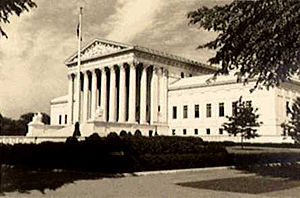 Indian Hill – the home of numerous leaders in the community, the nation, and the world – claims former Supreme Court Justice Potter Stewart (1915-1985) as one of its sons. He and his family resided on Shawnee Run Rd. before moving to Washington, D.C., where he became one of the honored Nine.
Indian Hill – the home of numerous leaders in the community, the nation, and the world – claims former Supreme Court Justice Potter Stewart (1915-1985) as one of its sons. He and his family resided on Shawnee Run Rd. before moving to Washington, D.C., where he became one of the honored Nine.
Stewart was born in Jackson, Michigan, where his parents had vacationed. His father was Cincinnati’s mayor and then an Ohio Supreme Court judge. A graduate of Hotchkiss and a Phi Beta Kappa at Yale, he studied at Cambridge, England, and was a cum laude student at Yale Law School. In 1941 he joined a Wall Street law firm. He served in the Navy during World War II, and then returned to New York.
In 1947 he returned to his native Cincinnati as a litigator. Law led to politics, and Stewart served on City Council and as Vice-Mayor. An Eisenhower appointee to the Sixth Circuit Court of Appeals, he established a reputation for clearheaded opinions; and at 39, he was the youngest U.S. federal judge. Potter and his wife, Mary Ann, raised three children: Harriet, Potter, Jr., and David, in Indian Hill.
 In 1958, Eisenhower appointed him to the Supreme Court at age 43. While there, he served on both the Warren Court (frequently as a conservative dissenting member) and the Burger Court, where he was often the swing vote. He promoted a common sense approach to problems that ideologically divided the Court and the nation.
In 1958, Eisenhower appointed him to the Supreme Court at age 43. While there, he served on both the Warren Court (frequently as a conservative dissenting member) and the Burger Court, where he was often the swing vote. He promoted a common sense approach to problems that ideologically divided the Court and the nation.
Since the Warren Court was closely divided on many important questions, junior member Stewart often had the deciding vote in his first few years. While both liberals and conservatives sought his vote during the internal lobbying, he chose not to align himself completely with either group, describing his role as “a lawyer.” Many of the opinions he wrote helped shape criminal procedures today. He espoused the principle that even when Government is entitled to information, it must proceed carefully and without intrusion when freedom of speech, press, religion, and association are involved. Another Stewart theme was resistance to Government officiousness. He wrote majority opinions which prohibited use in federal criminal trials of evidence illegally obtained by state authorities, prohibited unauthorized wiretaps, and restricted police from obtaining evidence without a search warrant.
In 1969, when Earl Warren retired, the press speculated that Stewart might be Chief Justice. However, Stewart privately urged President Nixon to name a Chief Justice from outside the Court, which led to the appointment of Warren Burger. Putting aside personal ambition, Stewart kept a promise to himself not to seek any higher office and also maintained more privacy for himself and his family.
Throughout his 23-year tenure on the Supreme Court, Potter Stewart was seen as a moderate between the liberal and conservative camps. His vote was often decisive, and many of his remarks became quotable. While admitting he could not define hard-core pornography, he noted, “I know it when I see it.” Later he characterized state death penalty laws as “cruel and unusual in the same way that being struck by lightning is cruel and unusual.” Outspoken in the courtroom, he often asked questions of the lawyers during arguments; and he kept the time-honored tradition of delivering entire opinions or dissents orally. Stewart was loyal to his hometown and an avid Cincinnati Reds fan. During one playoff year, he asked his clerks to send him memos with inning-by-inning scores during hearings.
Stewart retired from the Court in 1981, while still in good health. After his departure, he worked with the public broadcasting network on a series about the Constitution and was active in Recordings for the Blind Foundation of Washington. In 1985, he died after suffering a stroke near his longtime vacation home in New Hampshire. He was buried in Arlington National Cemetery. At that time he was called “a scholar who interpreted the Constitution without succumbing to the temptation to legislate from the bench… an outstanding man– a symbol of decency and honor.”
